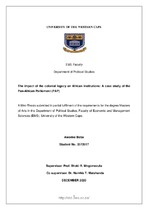| dc.contributor.advisor | Mngomezulu, Bheki R. | |
| dc.contributor.author | Baba, Awonke | |
| dc.date.accessioned | 2021-07-16T12:27:38Z | |
| dc.date.available | 2021-07-16T12:27:38Z | |
| dc.date.issued | 2020 | |
| dc.identifier.uri | http://hdl.handle.net/11394/8289 | |
| dc.description | Magister Philosophiae - MPhil | en_US |
| dc.description.abstract | After Independence in Africa, vast institutions were established in order to deal with the legacy of colonialism and to encourage development in the continent. Decades later, some of these institutions are said to be ineffective due to a number of constraints – one of which is the colonial legacy which has rendered them almost dysfunctional. This study assesses the impacts of colonialism on these African institutions and uses the Pan-African Parliament (PAP) as a case study. Guided by Post-colonial theory and Institutional theory, and using Content Analysis (CA) as a tool for data analysis, this study has found that African institutions are operating under the influence of ex-colonial countries. This is evidenced by how these institutions are using European languages as their medium of communication and receive more than half of their funds from international bodies which then control their operations. This contributes to their inability to make decisions due to conflicting interests within the representatives and member states. | en_US |
| dc.language.iso | en | en_US |
| dc.publisher | University of Western Cape | en_US |
| dc.subject | Colonialism | en_US |
| dc.subject | Pan-African Parliament | en_US |
| dc.subject | Institutions | en_US |
| dc.subject | Colonial legacy | en_US |
| dc.subject | Africa | en_US |
| dc.title | The impact of the colonial legacy on African institutions: A case study of the Pan-African Parliament (PAP) | en_US |
| dc.rights.holder | University of Western Cape | en_US |

